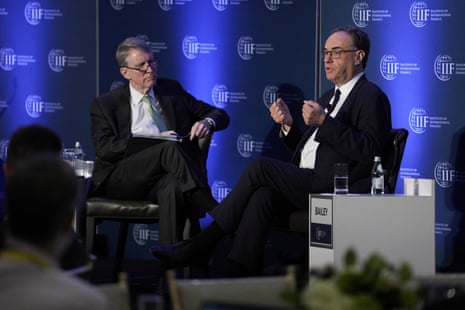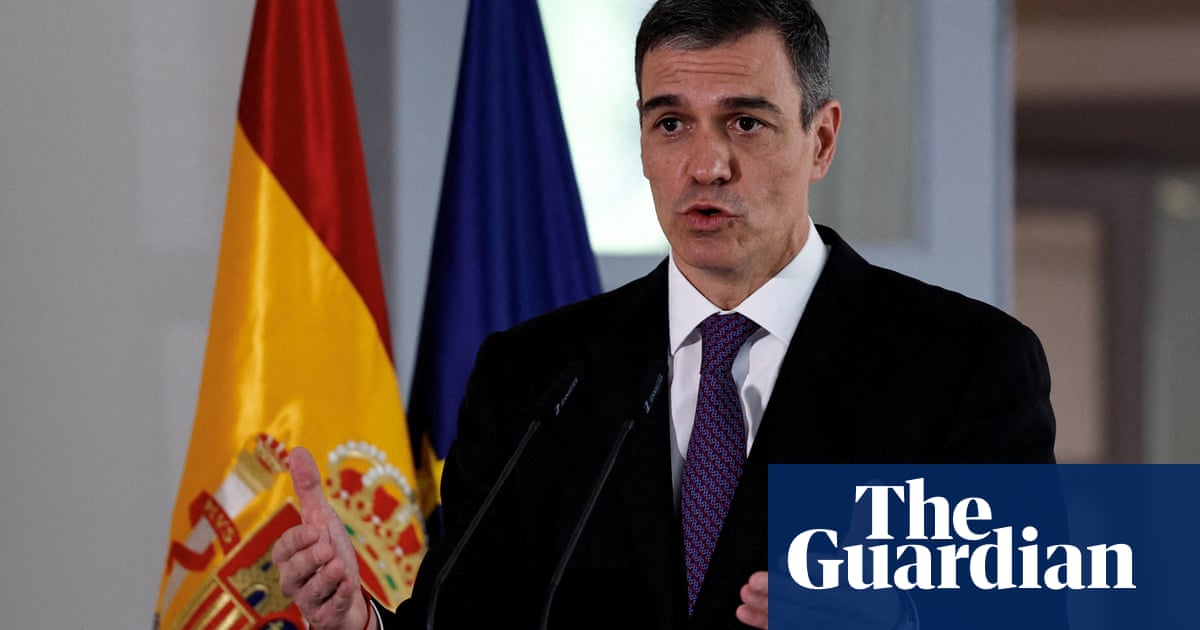Introduction: BoE governor Bailey warns trade war will hit UK growth
Good morning, and welcome to our rolling coverage of business, the financial markets and the world economy.
Fears are mounting that Donald Trump’s trade war will hurt the UK economy, even as the US president backtracks over some of his tougher measures.
Even though Britain is getting off relatively lightly with a 10% tariff, new trade disruption is likely to damage economic growth.
Andrew Bailey, the governor of the Bank of England, sounded the alarm in Washington last night, where the International Monetary Fund’s Spring Meeting is taking place.

Bailey told an Institute of International Finance event that the UK’s open economy was vulnerable to a global trade war.
Bailey explained:
“It’s not just the relationship between the US and the UK, it’s the relationship between the US, the UK and the rest of the world that matters so because the UK is such an open economy.
“We have to take very seriously the risk to growth. I’ve said a number of times, fragmenting the world economy will be bad for growth.”
The Bank will release its latest economic forecasts in two weeks, when it is widely expected to cut UK interest rates.
Earlier this week the IMF cut its forecast for UK growth this year to 1.1%, down from 1.6% predicted in January
The UK government has been pushing for a trade deal with the US. But on Wednesday, chancellor Rachel Reeves dashed hopes of an early breakthrough in negotiations, stressing that the UK is “not going to rush” into a deal.
Financial markets rallied yesterday after Trump said his tariffs on China would come down “substantially”, but not to zero.
These hints that the US might de-escalate tensions with Beijing are lifting the “mood music” in the markets, reports Michael Brown, senior research strategist at brokerage Pepperstone.
Brown adds:
Isn’t it remarkable how the ‘Art of the Deal’ appears to simply be for Trump to negotiate with himself (aka fold like a cheap suit), then to end up jumping around claiming a ‘win’ anyway.
The agenda
-
9am BST: IFO survey of Germany’s business climate
-
11am BST: CBI’s industrial trends survey of UK manufacturing
-
1pm BST: IMF to release Global Policy Agenda report
-
1.30pm BST: US weekly jobless claims data
-
1.30pm BST: US durable goods orders
Key events Show key events only Please turn on JavaScript to use this feature
ACEA’s latest European car sales report shows a continued decline in demand for fossil fuel-powered vehicles.
While new battery-electric car sales grew by 23.9% in the first three months of 2025, to 412,997 units, petrol car registrations saw a significant decline of 20.6%, with all major markets showing decreases.
France experienced the steepest drop, ACEA reports, with petrol registrations plummeting by 34.1%, followed by Germany (-26.6%), Italy (-15.8%), and Spain (-9.5%).
The diesel car market declined by 27.1%.

Tesla's European sales slide continues
Tesla’s share of the European car market has dropped again, following protests against the car maker’s CEO, Elon Musk.
Tesla’s market share in the European Union, the UK and the EFTA trade zone (Iceland, Liechtenstein, Norway, and Switzerland) fell to 2% in March, down from 2.9% in March 2024.
Total sales in the month fell to 28,502, down from 39,684 a year ago, new data from the European Automobile Manufacturers’ Association (ACEA) this morning show.
During 2025 so far, Tesla’s market share in the EU/UK/EFTA has dropped to 1.6%, from 2.5% in January-March 2024. Its sales are down 37%, to 54,020 from 86,027 in Q1 2024.
That’s despite a near-24% increase in overall battery-electric car sales in Europe so far this year.
Overall, car sales across Europe dipped by 0.2% in March, and are down 1.9% so far this year.
Earlier this week, Tesla reported a sharp tumble in profits and revenues in the first quarter of 2025 amid a backlash against his role in the Trump White House, where he has been driving cutbacks to federal services.
Protests against Musk, and Tesla, have been taking place in the US and across Europe in recent weeks, prompting reports of a European consumer backlash by some Tesla owners and prospective buyers.
Tesla’s recent sales decline has also been blamed on its ageing lineup of models (its Model Y has just been updated) and intense competition from rivals such as China’s BYD, as well as the backlash from Musk’s embrace of rightwing politics.
Introduction: BoE governor Bailey warns trade war will hit UK growth
Good morning, and welcome to our rolling coverage of business, the financial markets and the world economy.
Fears are mounting that Donald Trump’s trade war will hurt the UK economy, even as the US president backtracks over some of his tougher measures.
Even though Britain is getting off relatively lightly with a 10% tariff, new trade disruption is likely to damage economic growth.
Andrew Bailey, the governor of the Bank of England, sounded the alarm in Washington last night, where the International Monetary Fund’s Spring Meeting is taking place.

Bailey told an Institute of International Finance event that the UK’s open economy was vulnerable to a global trade war.
Bailey explained:
“It’s not just the relationship between the US and the UK, it’s the relationship between the US, the UK and the rest of the world that matters so because the UK is such an open economy.
“We have to take very seriously the risk to growth. I’ve said a number of times, fragmenting the world economy will be bad for growth.”
The Bank will release its latest economic forecasts in two weeks, when it is widely expected to cut UK interest rates.
Earlier this week the IMF cut its forecast for UK growth this year to 1.1%, down from 1.6% predicted in January
The UK government has been pushing for a trade deal with the US. But on Wednesday, chancellor Rachel Reeves dashed hopes of an early breakthrough in negotiations, stressing that the UK is “not going to rush” into a deal.
Financial markets rallied yesterday after Trump said his tariffs on China would come down “substantially”, but not to zero.
These hints that the US might de-escalate tensions with Beijing are lifting the “mood music” in the markets, reports Michael Brown, senior research strategist at brokerage Pepperstone.
Brown adds:
Isn’t it remarkable how the ‘Art of the Deal’ appears to simply be for Trump to negotiate with himself (aka fold like a cheap suit), then to end up jumping around claiming a ‘win’ anyway.
The agenda
-
9am BST: IFO survey of Germany’s business climate
-
11am BST: CBI’s industrial trends survey of UK manufacturing
-
1pm BST: IMF to release Global Policy Agenda report
-
1.30pm BST: US weekly jobless claims data
-
1.30pm BST: US durable goods orders

 7 hours ago
10
7 hours ago
10













































